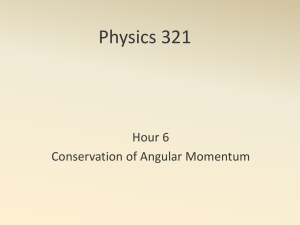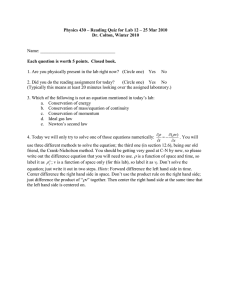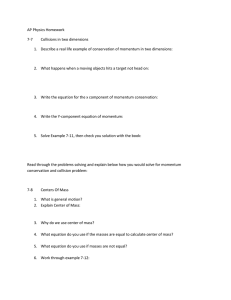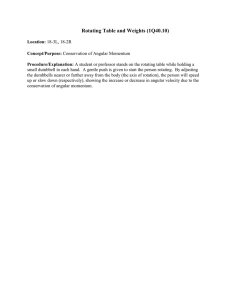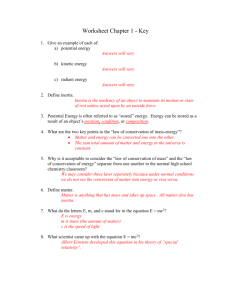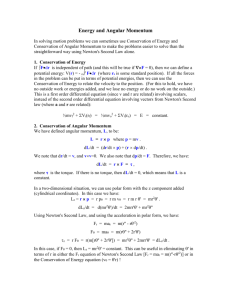the mechanical universe
advertisement
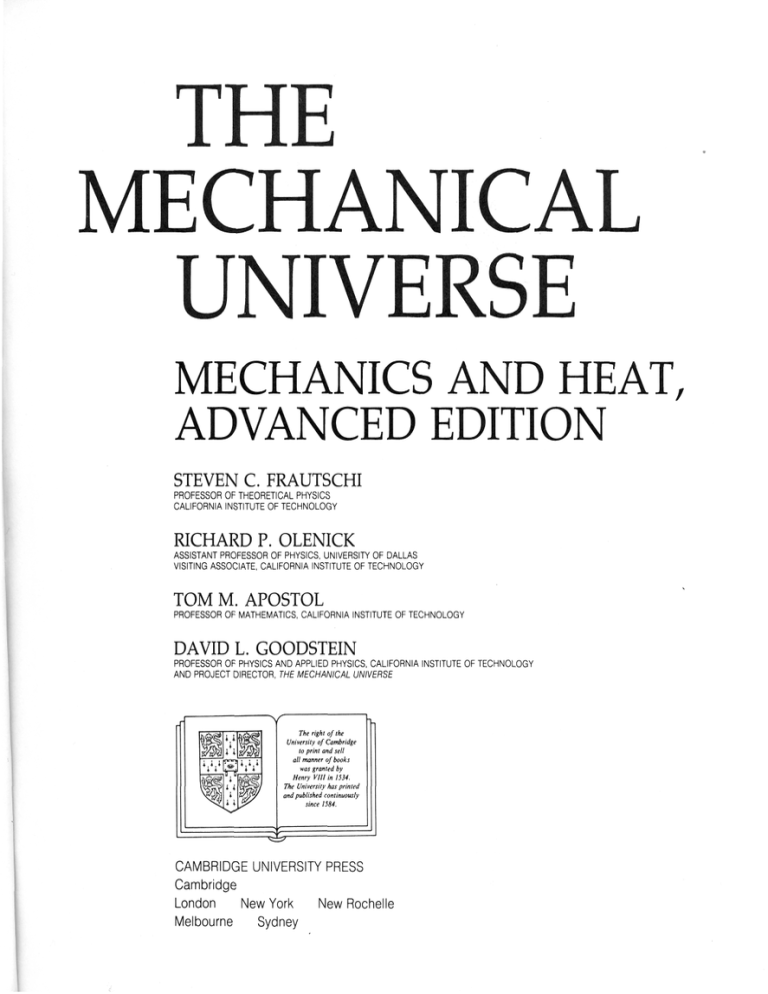
THE MECHANICAL UNIVERSE MECHANICS AND HEAT, ADVANCED EDITION STEVEN С FRAUTSCHI PROFESSOR OF THEORETICAL PHYSICS CALIFORNIA INSTITUTE OF TECHNOLOGY RICHARD P. OLENICK ASSISTANT PROFESSOR OF PHYSICS, UNIVERSITY OF DALLAS VISITING ASSOCIATE, CALIFORNIA INSTITUTE OF TECHNOLOGY TOM M. APOSTOL PROFESSOR OF MATHEMATICS, CALIFORNIA INSTITUTE OF TECHNOLOGY DAVID L. GOODSTEIN PROFESSOR OF PHYSICS AND APPLIED PHYSICS, CALIFORNIA INSTITUTE OF TECHNOLOGY AND PROJECT DIRECTOR, THE MECHANICAL UNIVERSE The right of the University of Cambridge to print and sell all manner of books was granted by Henry VIII in 1534. The University has printed and published continuously since 1584. CAMBRIDGE UNIVERSITY PRESS Cambridge London New York New Rochelle Melbourne Sydney CONTENTS Preface xiii Chapter 1 INTRODUCTION TO THE MECHANICAL UNIVERSE 1.1 The Copernican Revolution 1.2 Units and Dimensions 5 1.3 A Final Word 9 Problems 10 1 Chapter 2 THE LAW OF FALLING BODIES 2.1 2.2 2.3 2.4 11 Historical Background 11 Galileo's Law 12 Do Heavy Bodies Fall Faster Than Light Ones? Medieval Laws of Falling Bodies 14 12 1 2.5 2.6 2.7 2.8 2.9 Experimental Determination of the Law of Falling Bodies The Average Velocity of a Falling Body 18 Instantaneous Velocity: The Derivative 18 Acceleration 20 A Final Word 22 Problems 23 15 Chapter 3 THE LANGUAGE OF NATURE: DERIVATIVES AND INTEGRALS 3.1 3.2 3.3 3.4 3.5 3.6 3.7 3.8 3.9 The Development of Differential Calculus 27 Derivatives and Slopes of Tangent Lines 28 Leibniz's Notation. Analytic Definition of the Derivative 31 Rules of Differentiation and Derivatives of Special Functions 32 Antidifferentiation, the Reverse of Differentiation 38 Antidifferentiation and Quadrature 39 The Leibniz Integral Notation 44 Applications of the Second Fundamental Theorem to Physics 48 A Final Word 51 Problems 52 Chapter 4 INERTIA 4.1 4.2 4.3 4.4 4.5 4.6 If the Earth Moves: Aristotelian Objections The Earth Moves: Galileo's Law of Inertia Relative Motion 62 Projectile Motion: A Consequence of Inertia Calculating a Particular Trajectory 65 A Final Word 68 Problems 68 Chapter 5 VECTORS 5.1 5.2 5.3 5.4 5.5 5.6 5.7 5.8 5.9 57 57 60 63 75 Coordinate Systems 75 Vectors 77 . Addition and Subtraction of Vectors, and Multiplication by a Scalar The Scalar Product of Vectors 88 The Cross Product of Vectors 93 Derivatives of Vector Functions in a Fixed Coordinate System 96 Position Vector Expressed in Polar Coordinates 100 Uniform Circular Motion 101 A Final Word 105 Problems 106 Chapter 6 NEWTON'S LAWS AND EQUILIBRIUM 6.1 The End of the Confusion 6.2 Newton's Laws of Motion 7 73 774 773 CONTENTS 6.3 6.4 6.5 6.6 6.7 Units of Mass, Momentum, and Force 117 Projectile Motion as an Application of Newton's Second Law Equilibrium: Balance of Forces 720 Equilibrium: Balance of Torques 725 A Final Word 734 Problems 734 7 79 Chapter 7 UNIVERSAL GRAVITATION AND CIRCULAR MOTION 7.1 7.2 7.3 7.4 7.5 7.6 7.7 The Genesis of an Idea 747 The Law of Universal Gravitation 742 Acceleration of Gravity on the Earth 749 Why the Moon Doesn't Fall to the Earth 757 Circular Orbits 754 Other Examples of Uniform Circular Motion 756 A Final Word 759 Problems 760 Chapter 8 FORCES 8.1 8.2 8.3 8.4 8.5 8.6 8.7 8.8 8.9 763 The Fundamental Forces: Classification and Unification The Strength of Gravitational and Electric Forces 765 Contact Forces 768 Application of Newton's Laws 772 Friction 779 Driving on Curved Roadways 785 Motion in a Resistive Medium 787 The Oil-Drop Experiment 792 A Final Word 796 Problems 797 Chapter 9 FORCES IN ACCELERATING REFERENCE FRAMES 9.1 9.2 9.3 9.4 9.5 9.6 9.7 9.8 747 Inertial and Noninertial Reference Frames 203 Galilean Relativity 204 Inertial Forces 208 Inertial Forces in a Linearly Accelerating Frame Centrifugal Force 270 Effect of the Earth's Rotation on g 211 Centrifuges 273 A Final Word 275 Problems 276 279 227 203 208 Chapter 10 ENERGY: CONSERVATION AND CONVERSION 10.1 Toward an Idea of Energy 10.2 Work and Potential Energy 763 279 10.3 10.4 10.5 10.6 10.7 10.8 10.9 Kinetic Energy and the Conservation of Energy 228 Gravitational Potential Energy 236 Potential Energy and Stability 240 Heat and Energy 246 Mechanical Advantage and Efficiency of Machines 250 Power 252 A Final Word 253 Problems 254 Chapter 11 THE CONSERVATION OF MOMENTUM 11.1 11.2 11.3 11.4 11.5 11.6 11.7 11.8 11.9 The Universe as a Machine 263 Newton's Laws in Retrospect 265 The Center of Mass 266 The Law of Conservation of Momentum 269 Rocket Propulsion 273 Energy and Momentum Conservation in Collisions Center-of-Mass Coordinates 282 Impulse: Collision Forces and Times 286 A Final Word 288 Problems 289 Chapter 12 OSCILLATORY MOTION 12.1 12.2 12.3 12.4 12.5 12.6 12.7 12.8 12.9 12.10 12.11 12.12 12.13 275 295 Finding a Clock That Wouldn't Get Seasick 295 Simple Harmonic Motion 297 The General Solution of the Differential Equation of Simple Harmonic Motion 307 Examples of Simple Harmonic Oscillators 303 Energy Conservation and Simple Harmonic Motion 306 The Simple Pendulum 309 Gaining Insight Through Approximations 312 Damped Oscillations 313 Forced Oscillations 316 Describing Resonance 377 Damped Forced Oscillations 327 Swinging and Singing Wires in the Wind 326 A Final Word 327 Problems 330 Chapter 13 ANGULAR MOMENTUM 13.1 13.2 13.3 13.4 263 Rotary Motion 335 Torque and Angular Momentum Angular Momentum Conservation Force and Torque 342 335 336 338 13.5 13.6 13.7 13.8 Kepler's Law of Equal Areas 344 Vortices and Firestorms 348 Conservation of Angular Momentum and Energy A Final Word 355 Problems 356 Chapter 14 ROTATIONAL DYNAMICS FOR RIGID BODIES 14.1 14.2 14.3 14 A 14.5 14.6 14.7 14.8 14.9 14.10 14.11 14.12 14.13 14.14 473 An Ancient Question 473 The Gyroscope 475 Angular Velocity of Precession 422 The Earth as a Gyroscope 425 A Final Word 426 Problems 427 Chapter 16 KEPLER'S LAWS AND THE CONIC SECTIONS 16.1 16.2 16.3 16.4 16.5 16.6 16.7 16.8 363 Rotation of a Rigid Body About a Fixed Axis 363 Center of Mass of a Continuous Mass Distribution 364 Moment of Inertia 371 Calculation of Moments of Inertia 374 The Parallel-Axis Theorem 378 Energy and Work in Rigid-Body Rotation 381 Analogies Between Rotational and Translational Motion The Physical Pendulum 384 The Torsion Pendulum 387 Combined Translations and Rotations 388 Kinematics of the Rolling Wheel 393 Rolling Down an Inclined Plane 394 Coriolis Forces 396 A Final Word 407 Problems 407 Chapter 15 GYROSCOPES 15.1 15.2 15.3 15.4 15.5 350 The Quest for Precision 437 Kepler's Laws 433 Conic Sections 437 The Ellipse 439 The Conies and Eccentricity 439 Properties of the Ellipse 442 Cartesian Equations for Conic Sections A Final Word 448 Problems 448 446 437 CONTENTS X Chapter 17 SOLVING THE KEPLER PROBLEM 17.1 17.2 17.3 17.4 17.5 17.6 17.7 17.8 17.9 17.10 17.11 Setting the Stage 451 Polar Coordinates and the Unit Vectors г andO 452 Solution of the Kepler Problem 457 Celestial Omens: Comets 459 Energy and Eccentricity 460 Orbits and Eccentricity 467 Kepler's Third Law 463 Planetary Motion and Effective Potential 464 Applications of Orbital Dynamics 466 Calculating the Orbit From Initial Conditions 469 A Final Word 472 Problems 473 Chapter 18 NAVIGATING IN SPACE 18.1 18.2 18.3 18.4 18.5 477 Freeways in the Sky 477 Navigating in Space 478 Transfer Orbits 480 Gravity Assist 485 A Final Word 487 Problems 489 Chapter 19 TEMPERATURE AND THE GAS LAWS 19.1 19.2 19.3 19.4 19.5 497 Temperature and Pressure 497 The Gas Laws of Boyle, Charles, and Gay-Lussac The Ideal-Gas Law 499 Temperature and Energy 500 A Final Word 507 Problems 503 Chapter 20 THE ENGINE OF NATURE 20.1 20.2 20.3 20.4 20.5 20.6 20.7 457 505 The Age of Steam 505 Work and the Pressure-Volume Diagram 507 The First Law of Thermodynamics 572 Adiabatic and Isothermal Processes 575 The Second Law of Thermodynamics 579 The Carnot Engine 527 A Final Word 525 Problems 526 497 Chapter 21 ENTROPY 21.1 21.2 21.3 21.4 21.5 537 Toward an Understanding of Entropy 531 Engines and Entropy 534 Entropy and the Second Law of Thermodynamics An Implication of the Entropy Principle 547 A Final Word 544 Problems 544 Chapter 22 THE QUEST FOR LOW TEMPERATURE 22.1 22.2 22..3 22.4 22.5 22.6 539 547 Cooling Off 547 The States of Matter 548 Behavior of Water 557 Liquefaction of Gases 553 The Joule-Thomson Effect 557 A Final Word 559 Problems 560 Appendix A THE INTERNATIONAL SYSTEM OF UNITS Appendix В CONVERSION FACTORS 563 565 Appendix С FORMULAS FROM ALGEBRA, GEOMETRY, AND TRIGONOMETRY Appendix D ASTRONOMICAL DATA 577 Appendix E PHYSICAL CONSTANTS 573 SELECTED BIBLIOGRAPHY Index 579 575 569
